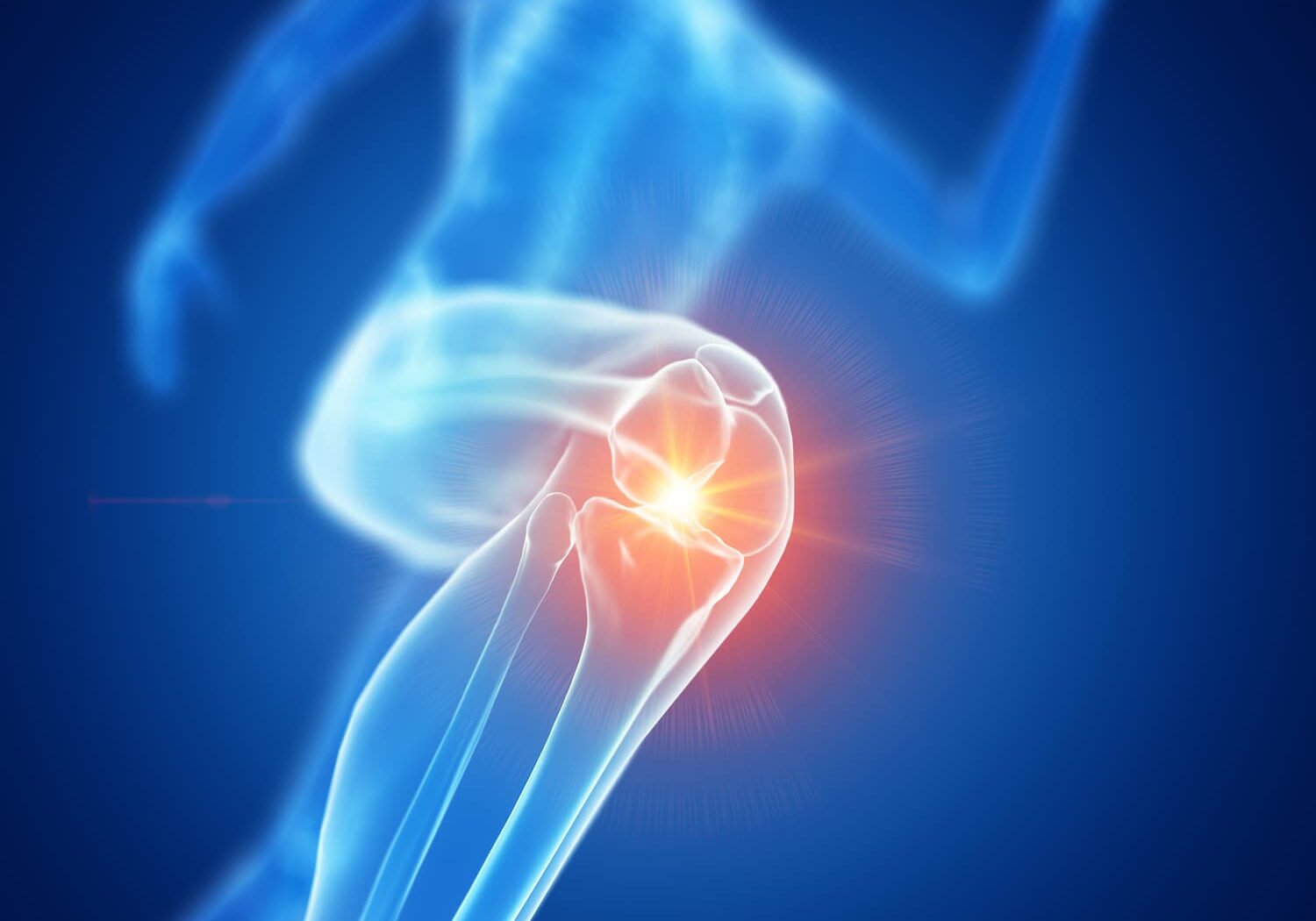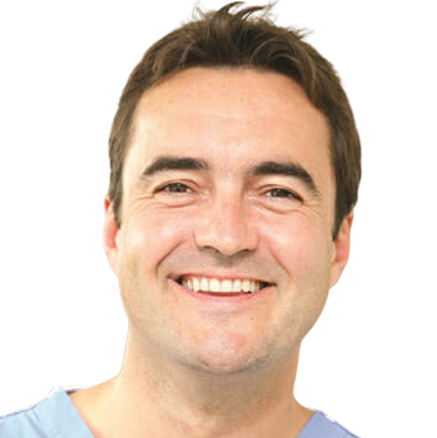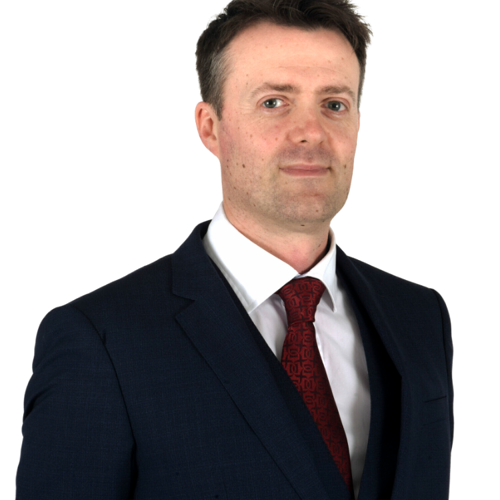Chronic knee pain is a common problem that can be caused by a range of underlying conditions. Treating and managing knee pain will often involve a multidisciplinary approach, with surgery being the final step if other methods have been unable to provide relief.
Having a knee arthroscopy can be an effective way to manage and alleviate chronic knee pain and can help to diagnose any underlying health condition causing pain to occur.
What is a knee arthroscopy?
Knee arthroscopy is a surgical procedure that uses minimally invasive (keyhole) techniques to treat underlying causes associated with chronic knee pain. The procedure can also be used to investigate the cause of your symptoms and determine the right course of treatment.
A knee arthroscopy uses a thin tube with a camera on one end that’s inserted into an incision near your knee. This allows your surgeon to look inside and assess your knee for any damage to the cartilage, joint lining and ligaments.
Having a knee arthroscopy can treat conditions like:
- Soft tissue injuries – the surgeon can remove or repair any damaged sections of tissue
- Fractures – the surgeon can shave off any damaged bone tissue they identify

What does a knee arthroscopy involve?
The operation is usually performed under a general anaesthetic. The operation usually takes about 30 to 45 minutes.
Your surgeon will usually make about two to four small incisions around the knee joint. They will place a thin telescope (camera) through one of the incisions so they can examine the joint in detail and place surgical instruments through others if they need to treat any problems with the joint.
Who needs a knee arthroscopy?
Your surgeon may recommend a knee arthroscopy if you:
- Need any damaged tissue or cartilage removed
- Need a biopsy (collection of tissue samples) performed to diagnose an infection
- Have chronic knee pain that hasn’t responded to non-surgical treatments such as medication
A knee arthroscopy may not improve pain and stiffness if you have osteoarthritis.
However, you may be recommended one if you have osteoarthritis and:
- Your knee catches or gives way
- Weight loss and exercise haven’t helped your osteoarthritis pain in the last three months
The arthroscopic knee surgery procedure: step-by-step
Before you undergo arthroscopic knee surgery, you may need to stop taking certain medications. However, your surgeon will advise you on whether this is the case, so don’t stop taking them without consulting them first.
Your surgeon will also advise you on when to stop eating and drinking before your procedure.
On the day of the surgery, you will be given a general anaesthetic to ensure you stay asleep throughout the whole procedure, which should take approximately 30 to 45 minutes to complete.
When starting the surgery, your surgeon will make two to four small incisions around your knee joint. They will then insert a thin tube with a camera on the end (arthroscope) into one of these incisions. This will relay images of your knee joint back to the screen, helping them assess or treat your knee.
Surgical instruments may also be placed into the other incisions if any additional treatments need to be carried out.
Once the assessment or repair and removal is complete, your incisions will be sealed with stitches and a dressing applied. You will then be taken to the recovery room while the effects of the general anaesthetic wear off.
Knee arthroscopy recovery and rehabilitation
Once you wake up from the surgery, you should be able to go home on the same day. However, you will not be able to drive so you’ll need to arrange for someone to pick you up from the hospital.
After your surgery, you may find walking uncomfortable but this should gradually improve as you recover. Your knee will also remain swollen for the first few weeks and could take several months until it fully recovers.
How soon will I recover?
Your recovery will likely be influenced by factors like:
- The number of additional treatments performed during the procedure
- Your overall health
- Whether there were any complications during the procedure
Your surgeon will advise you on when it’s safe to resume regular activities and you will need to check with them before starting exercise again. However, since exercise is an important part of your recovery, you may be provided with a list of gentle, daily exercises to complete at home.
Risks and complications of arthroscopic knee surgery
All surgical procedures have a risk of potential complications, but our highly experienced team do everything they can to minimise them.
General side effects such as pain, bleeding or difficulty passing urine are most often temporary and should ease over time. However, should any unexpected or longer term side effects arise, please do not hesitate to contact the Horder Healthcare team to help correct them.
Some of the general risks and complications associated with surgery include:
- Pain
- Bleeding
- Infection of the surgical site (wound)
- Scarring
- Blood clots
- Difficulty passing urine
These risks can be associated with many types of surgery. However, some complications are more specific to knee arthroscopies. These include:
- Damage to nerves around the knee
- Developing a lump under the wound
- Infection in the knee joint
- Severe pain, stiffness and loss of use of the knee (complex regional pain syndrome)
Are there any alternatives to a knee arthroscopy?
If you have problems inside your knee joint, these can sometimes be diagnosed with computed tomography (CT) or magnetic resonance imaging (MRI) scans. However, you may need to still undergo a knee arthroscopy to treat the underlying condition.
Non-steroidal anti-inflammatory drugs (NSAIDs) may help temporarily alleviate your pain. But if your pain does not respond to these or is getting worse, a knee arthroscopy may be the right line of treatment. Feel free to contact us if you’re not sure.

Information leaflet
This document is intended for information purposes only and should not replace advice that your relevant health professional would give you.
© EIDO Systems International
The operation and treatment information on this webpage is produced using information from EIDO Systems International and is licensed by Horder Healthcare. The information should not replace the advice that your relevant health professional would give you.
Guide price for self-pay patients
Arthroscopy of Knee
| Estimated Cost * | |
|---|---|
| Initial Consultation | from £220 |
| Diagnostics | from £85 |
| Treatment | from £3,351 |
Estimated total cost from £3,656
Estimated length of stay Day Case
* The guide price is effective from 1 January 2026
What's included
The treatment price includes surgery, a private en-suite room, inpatient physiotherapy when applicable, and follow-up consultation. The initial consultation fee and diagnostics will be charged separately. Our private patients also receive continuity of care up to and including 120 days following surgery.
The guide price is based on the usual clinical needs of patients. The price you pay might be different depending on your medical history and the type of implant you choose or your Consultant advises is best for you. Not all Consultants are signed up to Horder Healthcare’s treatment price, please check prior to your appointment.
Your price quotation will be made clear to you before you proceed with any tests, consultations, or treatment.
Self-pay

As a private patient, you don't have to wait for our outstanding care.
Health insurance

Our services are recognised by most of medical insurance companies.
Payment plans

Spread the cost of your treatment with Horder Healthcare 0% payment plans
The Horder Centre Price Promise
 Our prices will always be totally transparent and when you are quoted an all-inclusive procedure price for your operation it will be inclusive of all costs – with no hidden surprises.
Our prices will always be totally transparent and when you are quoted an all-inclusive procedure price for your operation it will be inclusive of all costs – with no hidden surprises.
If you find an alternative private hospital in your local area offering a better price for the same procedure, sold with the same service conditions, we’ll lower our price* to equal it.
*terms and conditions apply
* Price Promise terms & conditions:
(1) Initial consultation(s), diagnostic scans/tests and investigations required to establish a diagnosis are not part of your procedure price.
(2) Our price promise does not include Private Patient Units at NHS hospitals.
(3) Local area defined as within 15 miles of The Horder Centre hospital.
(4) We will match against personalised, written quotes only.
(5) Quotations must be less than 90 days old.
(6) Patients must meet the clinical criteria for admission to the Horder Centre.
Get referred to The Horder Centre today
The Horder Centre provides the highest quality services to NHS, privately insured and self-pay patients, from initial consultation and diagnostic tests right through to surgical treatment and rehabilitation.
We are rated as a 5* healthcare provider
Read our latest patient reviews on Doctify.














